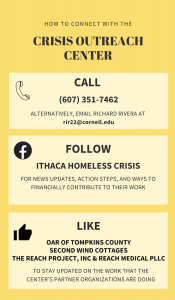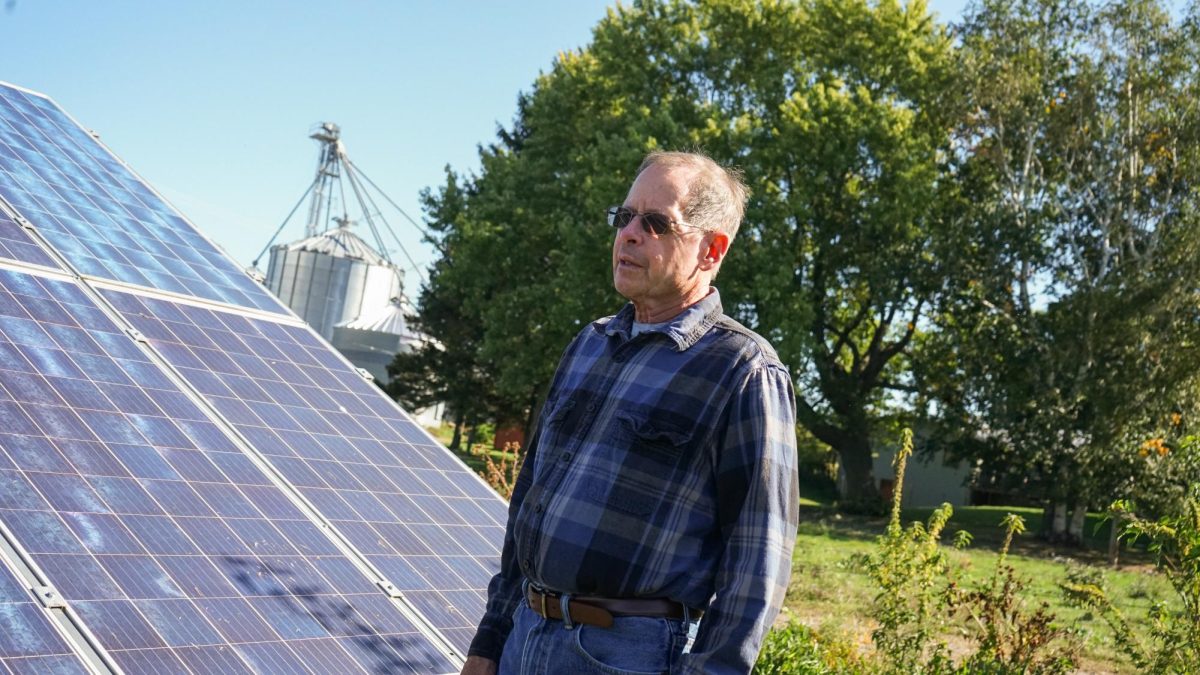In February 2021, the Crisis Outreach Center was established as a collaboration between three community organizations: Opportunities, Alternatives, and Resources (OAR) of Tompkins County; Second Wind Cottages; and REACH Medical. The Center was co-founded by Richard Rivera, social justice advocate at OAR and Ultimate Re-Entry Opportunity (URO), and Deb Wilke, the homeless crisis alleviation coordinator at Second Wind.
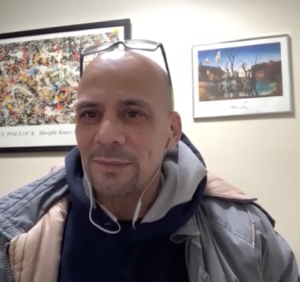
“The Crisis Outreach Center is not a program in itself, but the culmination of this string of services that are being provided, not only by us, but by every agency,” Rivera said. “It’s about providing this service that sustains life, that is accepting, that is compassionate, that is caring, so all these things come together.”
REACHing Out
The Crisis Outreach Center, in the Groundswell space at 225 S. Fulton St., is in close proximity to the encampments, Southside Community Center and the West Village Apartments.
Because of this central location, Rivera and REACH Medical hope that it can become a vaccine distribution point in the coming months.
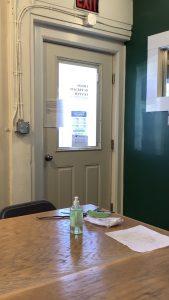
However, Samantha Stevenson, director of operations at
REACH Medical, said “the vaccine supply coming into Tompkins County is unpredictable,” so there is no set date for the distribution.
Addressing the Barriers
Wilke said she and Rivera previously worked through their respective organizations to provide services to unhoused individuals living in the encampments behind Walmart — also known as “The Jungle” — before they partnered to provide what they call Intensive Personalized Navigational Services.
As they worked to connect individuals with healthcare, housing and legal resources, Wilke and Rivera noted that they kept running into “impossible barriers” that could take weeks or months to work through. However, they said building and maintaining personal connections made all the difference.
“Based on our relationships, … they’re willing to share with us where they’re at,” Wilke said. “And … whatever their greatest need is, we can help them with that.”
“We’re not limited to one thing.” – Deb Wilke
“Our Work Isn’t Based on Numbers”
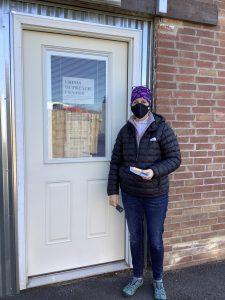
Rivera said the Center seeks to serve Black, brown and impoverished individuals in the Ithaca community with histories of mental health, substance abuse and other challenges. Although they hope to benefit all who need their services, Wilke said their work is never about statistics.
“If we can go through the process with one or two individuals and get them safely housed, into a better situation than they’re currently in, I’m thrilled with that one or two,” Wilke said.
Taking Action
After Amber Tan, Cornell student and OAR outreach volunteer, delivered food to the encampments with Rivera, she began to ask herself what she could do to give back in a more meaningful way.
“I think, as an outsider and who’s also someone who’s not an essential service worker, that if I’m going to be tagging along … the experience shouldn’t be centered on me,” Tan said. “And with that, you also have to be like, ‘OK, I’m an outsider.'”
“What can I do to help benefit these communities? What do they need that I can respond to?” — Amber Tan
Tan applied for and received a Cornell Engage grant, which allows her to distribute propane tanks to people living in the encampments.
Rivera said it is important for community members and students to follow Tan’s lead and get involved.
“We need people to get engaged in a compassionate way like that. Not to come as some sort of tourists, but to get engaged, to get involved,” Rivera said. “But if you can’t do that, give donations. Let us use the funds to provide the service that we provide the way we provide it.”
